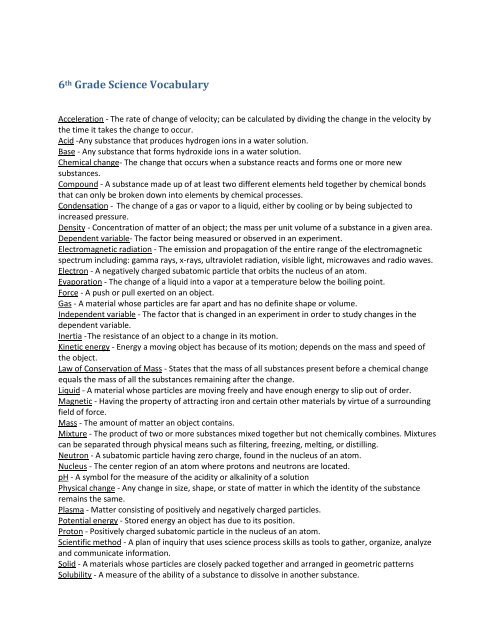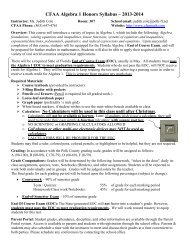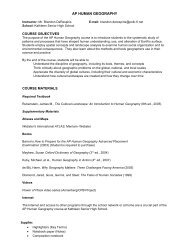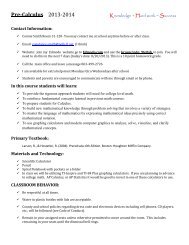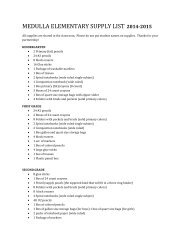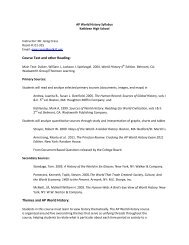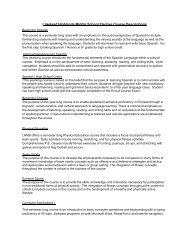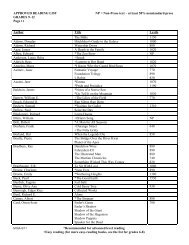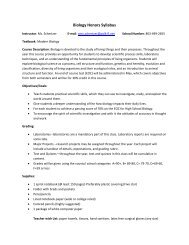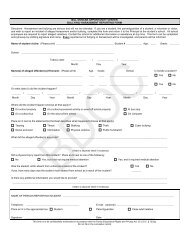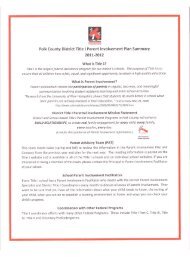6th Grade Science Vocabulary
6th Grade Science Vocabulary
6th Grade Science Vocabulary
You also want an ePaper? Increase the reach of your titles
YUMPU automatically turns print PDFs into web optimized ePapers that Google loves.
6 th <strong>Grade</strong> <strong>Science</strong> <strong>Vocabulary</strong><br />
Acceleration - The rate of change of velocity; can be calculated by dividing the change in the velocity by<br />
the time it takes the change to occur.<br />
Acid -Any substance that produces hydrogen ions in a water solution.<br />
Base - Any substance that forms hydroxide ions in a water solution.<br />
Chemical change- The change that occurs when a substance reacts and forms one or more new<br />
substances.<br />
Compound - A substance made up of at least two different elements held together by chemical bonds<br />
that can only be broken down into elements by chemical processes.<br />
Condensation - The change of a gas or vapor to a liquid, either by cooling or by being subjected to<br />
increased pressure.<br />
Density - Concentration of matter of an object; the mass per unit volume of a substance in a given area.<br />
Dependent variable- The factor being measured or observed in an experiment.<br />
Electromagnetic radiation - The emission and propagation of the entire range of the electromagnetic<br />
spectrum including: gamma rays, x-rays, ultraviolet radiation, visible light, microwaves and radio waves.<br />
Electron - A negatively charged subatomic particle that orbits the nucleus of an atom.<br />
Evaporation - The change of a liquid into a vapor at a temperature below the boiling point.<br />
Force - A push or pull exerted on an object.<br />
Gas - A material whose particles are far apart and has no definite shape or volume.<br />
Independent variable - The factor that is changed in an experiment in order to study changes in the<br />
dependent variable.<br />
Inertia - The resistance of an object to a change in its motion.<br />
Kinetic energy - Energy a moving object has because of its motion; depends on the mass and speed of<br />
the object.<br />
Law of Conservation of Mass - States that the mass of all substances present before a chemical change<br />
equals the mass of all the substances remaining after the change.<br />
Liquid - A material whose particles are moving freely and have enough energy to slip out of order.<br />
Magnetic - Having the property of attracting iron and certain other materials by virtue of a surrounding<br />
field of force.<br />
Mass - The amount of matter an object contains.<br />
Mixture - The product of two or more substances mixed together but not chemically combines. Mixtures<br />
can be separated through physical means such as filtering, freezing, melting, or distilling.<br />
Neutron - A subatomic particle having zero charge, found in the nucleus of an atom.<br />
Nucleus - The center region of an atom where protons and neutrons are located.<br />
pH - A symbol for the measure of the acidity or alkalinity of a solution<br />
Physical change - Any change in size, shape, or state of matter in which the identity of the substance<br />
remains the same.<br />
Plasma - Matter consisting of positively and negatively charged particles.<br />
Potential energy - Stored energy an object has due to its position.<br />
Proton - Positively charged subatomic particle in the nucleus of an atom.<br />
Scientific method - A plan of inquiry that uses science process skills as tools to gather, organize, analyze<br />
and communicate information.<br />
Solid - A materials whose particles are closely packed together and arranged in geometric patterns<br />
Solubility - A measure of the ability of a substance to dissolve in another substance.
Solution - A mixture of two or more substances uniformly dispersed throughout a single phase.<br />
Speed - Distance an object travels per unit of time.<br />
Velocity - The time-rate at which a body changes its position; defined as displacement divided by the<br />
time of travel.<br />
Volume - A measure of the amount of space an object takes up.


